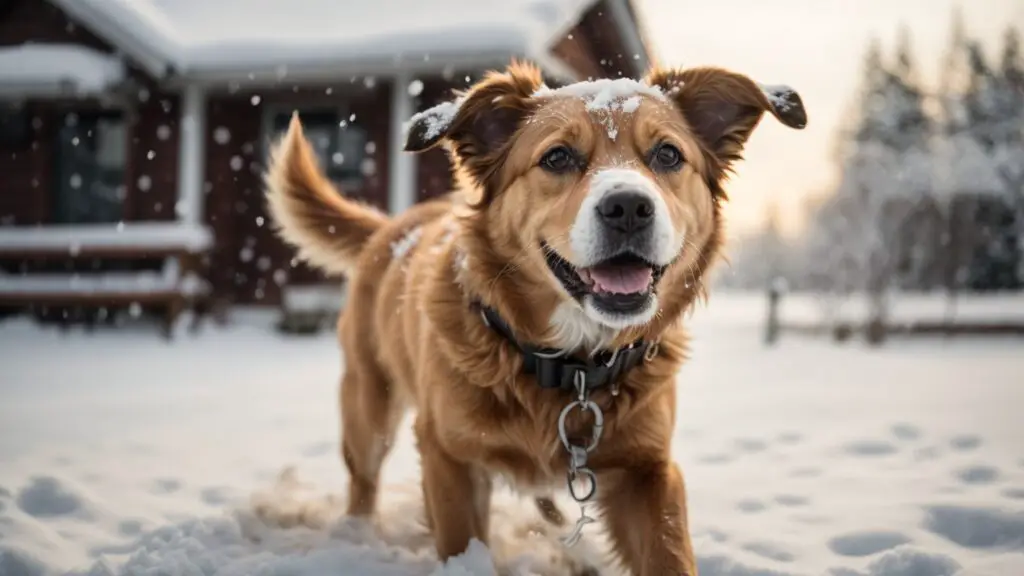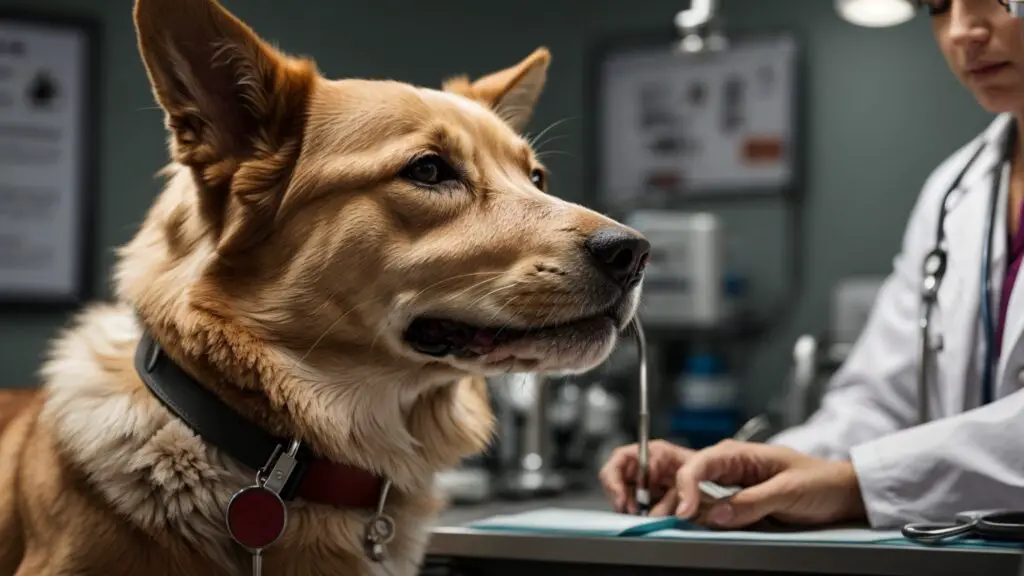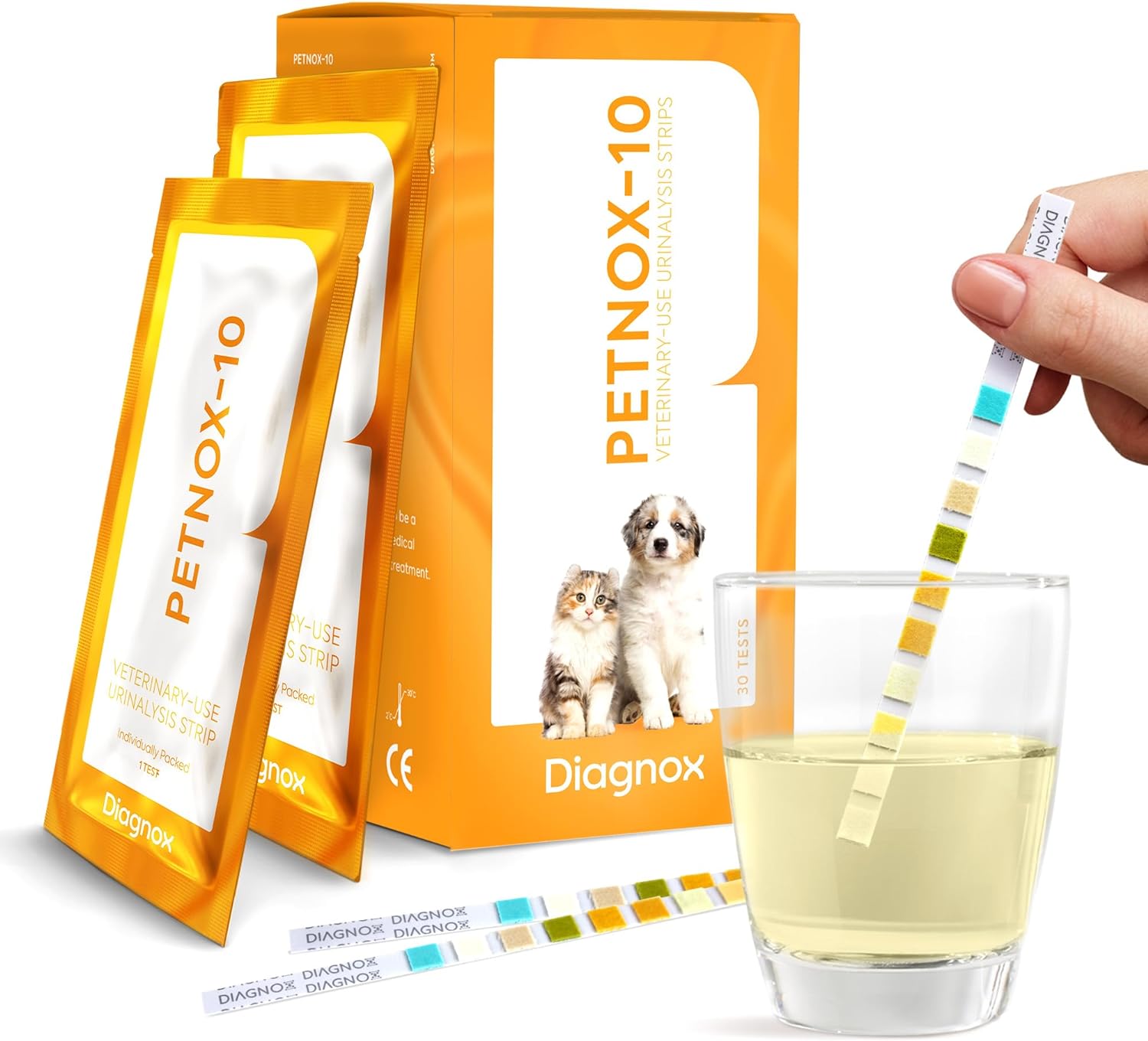Estimated reading time: 14 minutes
Introduction
Ever wondered, “Why is my dog’s mouth cold?” This question, often overlooked, is crucial in pet wellness and canine physiology. Discovering the reason behind your dog’s surprisingly cold mouth when you’re expecting a warm, comforting touch can raise concerns about symptoms that are not immediately obvious. Such observations can be a gateway to deeper insights into animal behavior and health. This comprehensive article delves into common and serious reasons behind a cold mouth in dogs, from seasonal effects to potential health issues.
The temperature of a dog’s mouth, a vital aspect of oral health, can fluctuate due to various factors. These range from external environmental conditions like weather influence and hypothermia risks to internal health challenges such as dehydration or other significant health signals. This exploration is crucial for understanding the broader context of dog’s health and veterinary care. By the conclusion of this piece, you’ll gain insights about this specific query – why is my dog’s mouth cold – and the comprehensive spectrum of pet wellness and care, emphasizing that every nuance is significant in ensuring the well-being of our cherished canine friends.
Key Takeaways
- Understanding Canine Body Temperature: A dog’s mouth is typically warm and moist, with a normal body temperature ranging from 101 to 102.5°F, so a colder mouth might indicate an underlying issue.
- Weather Impact on Dogs: External environmental conditions, such as cold weather, can significantly affect a dog’s mouth temperature, mirroring seasonal changes.
- Recognizing Health-Related Causes: Conditions like hypothyroidism and anemia can lead to a colder mouth in dogs, pointing to more serious health concerns that require veterinary attention.
- Home Health Checks for Dogs: Simple tests like gum checks and observing behavioral patterns can be initial steps in assessing your dog’s health at home.
- Essential Veterinary Consultation: Regular vet visits and specific diagnostic questions are crucial for addressing and understanding the cause of a dog’s cold mouth.
- General Dog Health Awareness: Beyond the temperature of their mouth, other signs such as bad breath, lethargy, or loss of appetite can indicate health issues in dogs.
- Maintaining Overall Dog Wellness: Regular vet check-ups, a proper diet, and physical exercise form the cornerstone of keeping a dog healthy and happy.
- When to Seek Professional Help: If a dog consistently has a cold mouth accompanied by other symptoms, it is advisable to consult a vet for proper diagnosis and treatment.
- Interpreting Dog Behavior: Understanding a dog’s non-verbal cues, including mouth temperature, helps in better addressing their health and emotional needs.
- Empowering Dog Owners: This guide empowers pet owners with knowledge and actionable steps to ensure the well-being and health of their furry companions.
What happens if My Dogs Mouth is Cold? Uncovering the Signals
When you notice your dog’s mouth is cold, it might initially seem puzzling, stirring concerns about their well-being. Various factors can lead to this condition, often signaling different aspects of your furry companion’s health. A cold mouth in dogs could be a simple result of them drinking cold water or being in a chilly environment. However, if you consistently find that your dog’s mouth feels cold, it could hint at more specific health-related issues.
Circulatory concerns or even mild hypothermia could be underlying causes, especially if other symptoms accompany the cold mouth. It’s crucial to observe if your dog has a cold mouth along with lethargy, shivering, or any unusual behavior, as these could necessitate a veterinary consultation. Understanding why is my dog’s mouth cold involves closely monitoring their environment, activities, and overall health. This vigilance ensures you’re attuned to your pet’s needs, fostering a healthy and happy life for your canine friend.

What is Normal Mouth Cold Temperature?
When you notice your dog’s mouth cold and question, “Why is my dogs mouth cold?” it’s essential to recognize that dogs regulate their body heat differently than humans. Unlike us, who sweat like humans, dogs don’t possess as many sweat glands and depend on panting for cooling. A mouth cold and white might suggest your dog isn’t feeling well, especially if the dog is lethargic or appears sick. A dog’s mouth and tongue should be a healthy pale pink, but for a mouth to feel dry or overly cold, particularly after giving cold treats or in cold outdoors, can happen. Smaller dogs might experience the cold more intensely, therefore their mouth will feel colder. If you’re concerned if my dog’s mouth is abnormally cold or if there are signs like a dog has dental problems, it’s advisable to call the vet. A cold mouth doesn’t automatically mean your dog is sick, but monitoring their condition is wise.
Understanding Canine Body Temperature
Dogs’ normal body temperature ranges between 101 and 102.5°F, a bit higher than that of humans. When assessing your dog’s health, one method is to feel their gums; they should be warm and moist. If you notice that your dog’s gums are cold, this could be a sign of concern. Cold gums in dogs may indicate various health issues, from minor ailments to more serious conditions. For instance, cold gums can be a possible reason for concern, as it may signify poor blood circulation or shock.
It’s also essential to consider that other symptoms accompanying cold gums could also cause alarm. For instance, lethargy or refusal to eat alongside cold gums should prompt a visit to the vet. Remember, while it’s not uncommon for pet owners to occasionally find that my dogs gums are cold, consistently cold gums warrant professional advice to rule out any underlying health problems.
Quick Checks for Normality
- Moist nose and mouth
- Regular eating habits
- Lively behaviour
My buddy Rex usually has a warm mouth, but there were a couple of times when it felt more relaxed. It turned out he was chilling (literally) after some ice water.
Could Weather be a Possible Reason?
Cold Weather Impact Dogs Mouth Temperature
When you bundle up in a jacket on a brisk day, it’s important to remember that your canine companion experiences the chill too. Take my dog Bella, for instance; she absolutely adores frolicking in the snow. However, post-playtime, I’ve noticed her mouth temperature drops noticeably. This change is a classic example of how environmental conditions can impact canine thermal regulation. To ensure your pet’s comfort and health, especially when it comes to skin and coat health, adapting your grooming routine to suit different weather conditions is essential. Delving deeper into seasonal health tips can provide you with insights on how to maintain your dog’s comfort and well-being throughout various environmental changes.
Seasonal Changes and Dog Health
- Winter: Cooler mouth, less activity
- Summer: Warmer mouth, more panting
Weather Adaptation Tips
- Insulated bedding
- Room temperature water
- Limited outdoor time during extreme weather

Medical Reasons for a Dogs Mouth Cold
Hypothyroidism
Medical reasons behind a dog cold mouth can often be more intricate than one might initially suspect. Hypothyroidism stands out as a primary condition that can lead to such symptoms. When the thyroid gland is not producing enough hormones, it doesn’t just slow down the metabolism, leading to weight gain; it also impacts the dog’s ability to regulate body temperature efficiently. This hormonal imbalance can result in your pet exhibiting a colder mouth than usual. If you’ve observed that your dogs mouth is cold, it’s essential to consider hypothyroidism as a potential underlying cause. This condition requires a veterinary diagnosis, as it affects not only the dog’s mouth being cold but also their overall energy levels and health. Being proactive about such signs, including noticing when a dog has a cold mouth, is crucial for the timely management and treatment of this endocrine disorder, ensuring the well-being of your furry friend.
Treatment Options
- Medication like Levothyroxine
- Regular vet check-ups
- Diet modifications
Anemia
Anemia in dogs, characterized by a reduction in red blood cells, has far-reaching effects on their overall health, particularly influencing the circulatory system. This condition not only affects your dog’s mouth temperature but also impacts the crucial function of oxygen transport throughout their body. As a pet owner, it’s important to be vigilant for systemic symptoms of anemia, which include not just the observable fatigue and pale gums but may also involve iron deficiency. Recognizing these signs early is vital for prompt and accurate diagnostic criteria to manage this blood disorder effectively, thereby maintaining optimal canine health.
Signs of Anemia
- Pale gums
- Fatigue
- Unresponsiveness
Other Medical Conditions
Kidney Issues
Kidney problems can lead to poor circulation, affecting body temperature.
Poor Circulation
Poor blood flow can contribute to a colder mouth.
Respiratory Infections
Sometimes, infections can cause abnormal body temperatures.
Note: These are severe conditions that need immediate vet attention.

Testing Your Dog’s Health at Home
Before rushing to conclusions or the vet when i notice my dogs mouth is cold, conducting some basic health checks at home can be a proactive step. Observing for additional symptoms that accompany a cold mouth in your dog can help determine if a vet visit is necessary. Check their energy levels, appetite, and look for any signs of discomfort or unusual behavior. It’s also beneficial to monitor their body temperature using a pet-safe thermometer. A dog mouth cold might not always signal a serious issue, but consistent observation and simple home health assessments can provide peace of mind or early detection of potential concerns. Remember, while these home checks are helpful, they don’t replace professional veterinary advice. If your dog has cold mouth persistently or shows other worrying symptoms, it’s crucial to consult your vet for a thorough examination and guidance.
Simple Home Tests
- Gum Check: Healthy gums are a good sign.
- Behavioural Analysis: Active and alert behaviour is generally favourable.
Tools You Can Use
- Thermometer
- Activity Monitor
When to Visit the Vet?
If something feels off, especially if symptoms persist, it’s vet time, no questions asked.
Questions to Ask Your Vet
Heading to the vet? Go prepared. Here are some crucial questions to consider:
Diagnostic Queries
- Could this be a symptom of a more serious condition?
- What tests should we do?
- Is immediate treatment required?
By knowing the right questions, you’re a step closer to understanding what’s up with your dog.
A cold mouth could be just a quirk or a sign that your furball needs medical attention. Being informed is half the battle won. Keep these points in mind, and you’re on your way to becoming the Sherlock Holmes of doggy health!
General Information About Dog Health
Hey folks, let’s zoom out a bit and talk about other ways your pup can show you how they’re feeling. Trust me, it’s not just about cold mouths or warm noses; our four-legged friends have their unique language of saying, “Hey, something’s not right.”
Other Signs of Ill Health in Dogs
The Warning Signs
Sometimes, it’s not the mouth or the nose; there are other red flags to consider.
Bad Breath
Stinky breath isn’t just unpleasant—it could mean dental issues or digestive problems.
My dog, Sparky, started having super lousy breath. Initially, I blamed it on his love for cheese, but a quick vet visit revealed gingivitis. Don’t ignore bad breath, people!
Possible Causes
- Gum disease
- Digestive issues
- Diet
Lethargy
If your usually bouncy pup seems down and out, it’s a big deal. Lethargy could mean anything from fatigue to something more severe.
Lethargy Warning Signs
- Sleeping more than usual
- Lack of interest in activities
- Slow movement
Loss of Appetite
Dogs love to eat; that’s a universal truth. If your dog starts ignoring their kibble, that’s cause for concern.
Reasons for Appetite Loss
- Dental issues
- Illness
- Behavioural issues
Tips for Maintaining Dog Health
Okay, let’s shift gears and talk about keeping your pup in tip-top shape.
Regular Vet Visits
I can’t stress this enough: a routine check-up can save you a lot of stress down the line. It’s the best way to catch issues before they become full-blown problems.
Proper Diet
You are what you eat, and the same goes for dogs. Avoid foods that are toxic to them, like chocolate and grapes. How about insuring your pet for emergencies?
What to Include in a Balanced Diet
- Protein
- Veggies
- Healthy fats
Fun Fact: Did you know that blueberries make excellent treats for dogs? They’re full of antioxidants!
Physical Exercise: More Than Just a Walk in the Park
Engaging your dog in physical exercise is about much more than the daily walks. Such activities significantly contribute to both their physical and mental well-being. Diverse exercise routines like fetch, agility training, or even a playful game of tag are not only enjoyable but also crucial for their overall canine fitness. These exercises aid in enhancing cardiovascular health, building muscle strength, providing behavioral stimulation, and maintaining joint flexibility. Regular physical activities like these play a vital role in the holistic health benefits for dogs, ensuring they stay healthy, happy, and well-balanced.
Exercise Ideas
- Fetch
- Agility training
- Doggy swimming
Pro Tip: Don’t underestimate the power of mental exercise. Puzzle toys can keep their brains sharp, too.
In a nutshell, dog health isn’t a one-size-fits-all topic. It’s a blend of good food, physical activity, and regular vet checks. Keep these tips in mind, and you’ll be well on your way to giving your dog a happy, healthy life.
We’ve been on quite the journey talking about your dog’s mouth temp, health signs, and overall well-being. So, what’s the takeaway? A cold mouth doesn’t always spell trouble, but it shouldn’t be ignored either.
When to Worry and When Not to
When distinguishing when to worry and when not to about your dog’s mouth temperature, it’s essential to understand the factors that can cause a mouth to feel cooler. Cold temperatures and behaviors like licking cold surfaces can naturally make your dog’s lips and gums feel cold to the touch. For example, after playing outside in the snow or cold foods and treats, it’s not unusual for your dog’s mouth might feel cooler, similar to how humans might react in similar conditions. However, a dry mouth or if the tongue feels excessively cold, along with signs such as pale or white gums, could indicate a more serious condition. If you find your dog with a cold mouth that also seems feel colder than usual, and especially if accompanied by symptoms like lethargy or loss of appetite, it could signal an underlying health issue. In these instances, being concerned if my dog’s mouth appears cold and white is justified. Always make sure your dog is evaluated by a veterinarian if you observe any alarming signs, as they could be among the 10 reasons your pet’s health needs attention.
A Quick Recap
- Average Mouth Temp: Generally moist and a bit warm
- Weather Impact: Cold weather can affect mouth temperature
- Medical Conditions: Hypothyroidism, Anemia, etc. could be the culprits
| Condition | Potential Symptom |
|---|---|
| Normal | Moist, slightly warm mouth |
| Weather-Related | Temporarily cold mouth |
| Medical | Persistent cold mouth, other symptoms |
Vet Time or Not?
As the age-old saying goes, “Better safe than sorry.” If you’re unsure, take your puppy to the vet. It’s the most direct way to rule out anything serious.
Questions to Revisit for Your Vet
- Could this cold mouth be a symptom of something bigger?
- What tests are essential for diagnosis?
- Immediate treatment: Yay or Nay?
Here’s to Happy, Healthy Fur Babies!
Our pets depend on us to be their voice. So, pay attention, notice the little things, and never hesitate to seek professional advice when needed.
I always keep a pet first-aid kit in my car. It’s come in handy more times than I can count. Maybe that’s something to consider for your peace of mind as well.
Let’s toast to many more tail wags, wet noses, and, of course, happy and healthy lives for our fur babies!

- 30 x Individually Packed
- Veterinary Grade Tests
- Cat & Dog UTI Test Kit
- Pet Test Strips for Urinalysis
Conclusion
As we conclude our journey through the nuances of why is my dog’s mouth cold, it becomes clear that this query extends far beyond mere curiosity. It delves deep into the realm of canine health and well-being, touching upon various factors from environmental influences to canine diseases. While a cold mouth might sometimes result from benign activities like sipping cold water, it’s essential for dog owners to be adept at symptom assessment. Conditions like hypothyroidism and anemia, or even neglected aspects of oral hygiene, can transform this simple observation into a red flag for more serious health issues.
This exploration, rich in details about veterinary diagnosis, immune responses, and temperature regulation, serves as an indispensable resource in discerning the ordinary from the alarming. It highlights the crucial role of regular veterinary check-ups in preemptively addressing potential health concerns, from nutritional factors to dental health. Our role as responsible pet owners encompasses being vigilant and informed guardians, dedicated to ensuring our beloved canine companions lead joyous and healthy lives. Embracing this duty means recognizing the importance of understanding every aspect of their health, including subtle changes in behavior or physical condition like a cold mouth. This comprehensive approach to pet care is not just an obligation but a privilege, enabling us to provide the best possible life for our furry family members.

James Dunnington leads the James Dunnington Collection, featuring five unique blogs: a practical Pet Care Guide, an enlightening Ancient History Blog, a resourceful Home Improvement Guide, a cutting-edge Tech Innovation Guide, and a strategic Online Money Making platform. Each site delivers valuable insights designed to empower and inform. For updates and more tips, visit our Contact Us page to sign up for our newsletter, ensuring you never miss out on the latest content from any of these dynamic fields.
